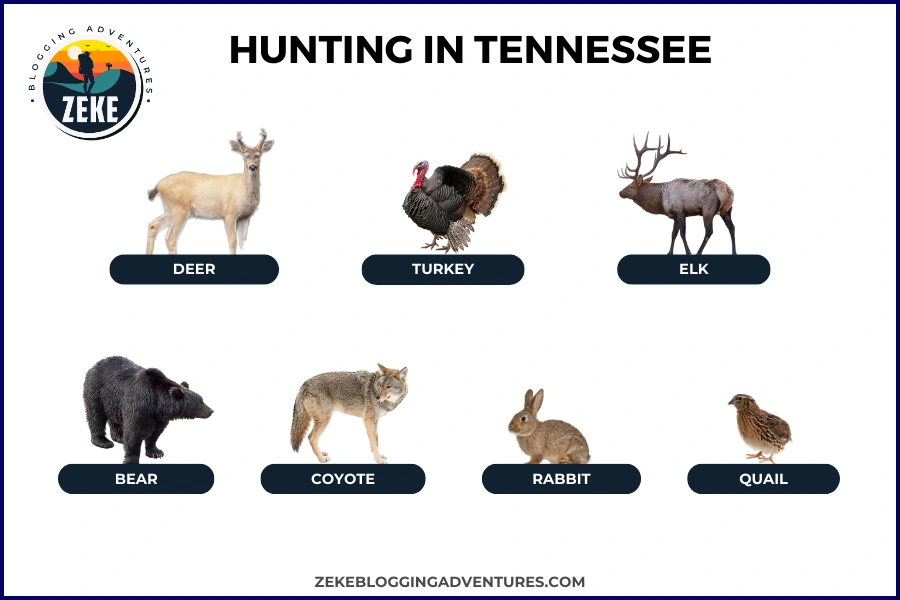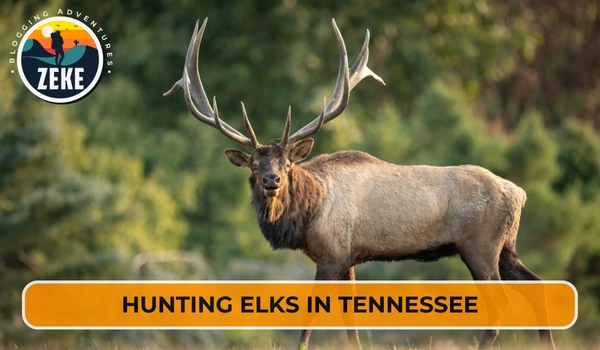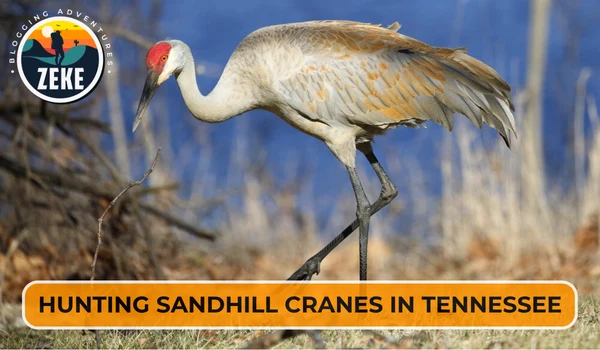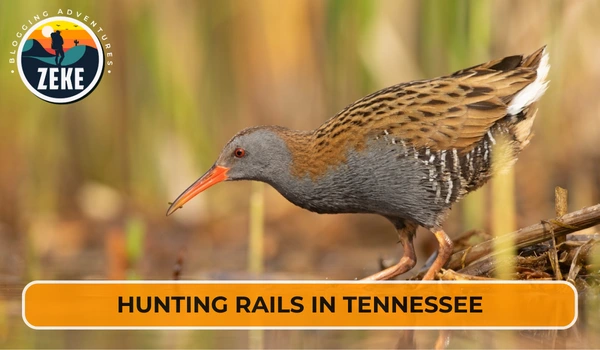Welcome to Tennessee, the ultimate destination for hunters! The lush forests and rolling hills are a dream come true, full of diverse wildlife ready to be discovered. Hunting here is an adventure like no other; you can find yourself quietly stalking deer one day and chasing down wild turkeys the next.
It’s not only about catching game but also enjoying the beautiful outdoors that this state has been blessed with – so get your gear together and let’s explore what makes hunting in Tennessee so special!
In this complete guide, we have covered all you need to know about hunting in Tennessee. We will discuss what type of animals you can hunt here, where to find them, seasons, and license information on this page.

What Can You Hunt in Tennessee?
If you’re looking to hunt big game in The Volunteer State, the TWRA (Tennessee Wildlife Resources Agency) has got you covered. They have all the information and regulations needed for season dates and special hunts specifically catered towards youth or disabled hunters.
For those who prefer small game hunting, there are plenty of opportunities too – from rabbits to squirrels scattered across public lands which don’t require any permits or licenses! Not only that but waterfowl such as ducks and geese are also the fair game with proper licensing.
If you want a more unique experience, why not go after some furbearers like opossums, foxes, or raccoons? No matter what kind of hunt fits your fancy, there’s sure something out there for everyone in Tennessee.
Deer
The majestic white-tailed deer roam all over Tennessee, from the lush hills of the East to the flatlands of the West. These graceful creatures are known for their signature white tail that they flash when startled – earning them an unforgettable name.
Fall is one of the best times to hunt for these animals as temperatures drop and leaves start to change color, signaling mating season and increased activity. There’s something special in store here for every type of hunter with plenty of hunting methods available like archery, muzzleloader, or rifle hunts; each zone has different regulations too so be sure you know what’s up before heading out!
When on a mission to bag yourself a white-tailed deer, it can pay off big time if you go slow and steady – they have excellent senses so keep your presence undetected by remaining still and quiet or using calls/scents strategically.
Plus, remember that aside from being great game animals, these wild mammals play an essential role in maintaining our ecosystem by consuming vegetation while also providing food sources for predators such as coyotes or bobcats. Safety should always come first though, make sure you’ve got all necessary licenses and permits plus wear bright orange clothing at all times when hunting this animal!
Deer Season Tennessee
Unit A (Antlered Bag Limit 2)
| Season | Dates | Bag Limit (Antlerless) |
| August | 25 Aug – 27 Aug | Closed |
| Archery | 23 Sep – 27 Oct, 30 Oct – 03 Nov | 4 |
| Young Sportsman | 28 Oct – 29 Oct, 13 Jan – 14 Jan | 2 |
| Muzzleloader/Archery | 04 Nov – 17 Nov | 2 |
| Gun/Muzzleloader/Archery | 18 Nov – 07 Jan | 2 |
Unit B (Antlered Bag Limit 2)
| Season | Dates | Bag Limit (Antlerless) |
| August | 25 Aug – 27 Aug | Closed |
| Archery | 23 Sep – 27 Oct, 30 Oct – 03 Nov | 4 |
| Young Sportsman | 28 Oct – 29 Oct, 13 Jan – 14 Jan | 2 |
| Muzzleloader/Archery | 04 Nov – 17 Nov | 2 |
| Gun/Muzzleloader/Archery | 18 Nov – 07 Jan | 1 |
Unit C (Antlered Bag Limit 2)
| Season | Dates | Bag Limit (Antlerless) |
| August | 25 Aug – 27 Aug | Closed |
| Archery | 23 Sep – 27 Oct, 30 Oct – 03 Nov | 4 |
| Young Sportsman | 28 Oct – 29 Oct, 13 Jan – 14 Jan | 2 |
| Muzzleloader/Archery | 04 Nov – 17 Nov | 1 |
| Gun/Muzzleloader/Archery | 18 Nov – 07 Jan | 1 |
Unit D (Antlered Bag Limit 2)
| Season | Dates | Bag Limit (Antlerless) |
| August | 25 Aug – 27 Aug | Closed |
| Archery | 23 Sep – 27 Oct, 30 Oct – 03 Nov | 4 |
| Young Sportsman | 28 Oct – 29 Oct, 13 Jan – 14 Jan | 2 |
| Muzzleloader/Archery | 04 Nov – 17 Nov | 1 |
| Gun/Muzzleloader/Archery | 18 Nov – 07 Jan | 1 |
Unit L (Antlered Bag Limit 2)
| Season | Dates | Bag Limit (Antlerless) |
| August | 25 Aug – 27 Aug | Closed |
| Archery | 23 Sep – 27 Oct, 30 Oct – 03 Nov | 3 per day |
| Young Sportsman | 28 Oct – 29 Oct, 13 Jan – 14 Jan | 3 per day |
| Muzzleloader/Archery | 04 Nov – 17 Nov | 3 per day |
| Gun/Muzzleloader/Archery | 18 Nov – 07 Jan | 3 per day |
| Private Lands Only | 08 Jan – 12 Jan | 3 per day |
Unit CWD (Antlered Bag Limit 3)
| Season | Dates | Bag Limit |
| August | 25 Aug – 27 Aug | Closed |
| Archery | 23 Sep – 27 Oct | 3 per day |
| Young Sportsman | 28 Oct – 29 Oct, 13 Jan – 14 Jan | 3 per day |
| Gun/Muzzleloader/Archery | 30 Oct – 12 Jan, 15 Jan – 31 Jan | 3 per day |
Elk
Elk, otherwise known as wapiti, are some of the largest deer in North America and can be found thriving here in Tennessee. These impressive animals were once on the brink of extinction due to overhunting and habitat loss but conservation efforts have allowed them to rebound significantly. In fact, this state is home to one of the biggest free-roaming elk herds east of the Mississippi River!
No doubt about it – these majestic creatures command respect. With their towering antlers and brawny build, they possess strength beyond compare while also possessing an elegance that’s hard not to admire.
But don’t let appearances fool you; when hunting elk, skillful preparation is absolutely key if you want any success because these beasts are no pushovers – they’re smart and cunningly elusive creatures requiring patience from hunters even after tracking them down successfully.
That being said, it’s important for us all to remember ethical hunting practices whenever we pursue these awe-inspiring beings out there in nature which is why we always encourage our fellow outdoorsmen to take advantage of designated elk zones across Tennessee where opportunities abound for those lucky enough with a tag!

Elk Season (via Permit only)
| Season | Dates | Bag Limit |
| Archery | 28 Sep – 04 Oct | 1 antlered elk |
| Gun/Muzzleloader/Archery | 05 Oct – 11 Oct | 1 antlered elk |
| Gun/Muzzleloader/Archery Young Sportsman | 12 Oct – 18 Oct | 1 antlered elk |
Bear
Tennessee is a proud home to thousands of black bears, with an estimated population of up to 6,000. These majestic creatures can reach heights over six feet tall and they can weigh up to 600 pounds too! Their distinctive thick black fur makes them truly breathtaking in the wild.
Black bears are omnivores that feast on berries, nuts, insects, and even small mammals. This hearty diet helps these animals thrive across various landscapes throughout Tennessee.
When hunting for black bears in this state though, it’s important you get the necessary permits before heading out into the field as regulations must be followed closely, especially during the season which runs from September until December depending on where you’re located.
If you fancy yourself a bit of a hunter, then spot-and-stalk is probably your best bet; patiently scouting for bear activity and then slowly but surely creeping within shooting range requires keen eyesight and stealthy movements so it’s no surprise this method has grown increasingly popular amongst hunters here in Tennessee.
Baiting isn’t far behind either as setting traps near areas known for high bear activity provides more control when pursuing these elusive beasts.
Bear Season Tennessee
| Season | Dates | Zones |
| Archery (Dogs not allowed) | 23 Sep – 20 Oct | 1, 2, 3, 4 |
| Gun/Muzzleloader/Archery (Dogs not allowed) | 18 Nov – 21 Nov | 1, 2, 3 |
| Young Sportsman Gun/Muzzleloader/Archery (Dogs not allowed) | 28 Oct – 29 Oct | 1, 2, 3 |
| Gun/Muzzleloader/Archery (Dogs allowed) | 07 Oct – 09 Oct, 14 Oct – 15 Oct | 1 |
| Gun/Muzzleloader/Archery (Dogs allowed) | 07 Oct – 10 Oct, 13 Oct – 15 Oct | 2 |
| Gun/Muzzleloader/Archery (Dogs allowed) | 30 Sep – 01 Oct, 07 Oct – 13 Oct | 3 |
| Gun/Muzzleloader/Archery (Dogs allowed) | 06 Nov – 13 Nov | 1 |
| Gun/Muzzleloader/Archery (Dogs allowed) | 30 Oct – 03 Nov | 2 |
| Gun/Muzzleloader/Archery (Dogs allowed) | 30 Oct – 03 Nov | 3 |
| Gun/Muzzleloader/Archery (Dogs allowed) | 27 Nov – 13 Dec | 1 |
| Gun/Muzzleloader/Archery (Dogs allowed) | 27 Nov – 21 Dec | 2 |
| Gun/Muzzleloader/Archery (Dogs allowed) | 27 Nov – 10 Dec | 3 |
| Gun/Muzzleloader/Archery (Dogs allowed) | 28 Dec – 31 Dec | 3 |
Coyote
The best season for hunting coyotes in Tennessee is usually from January to March when these wily creatures are more active and vocal. As experienced hunters know, the right gear is essential in getting a successful kill. We recommend using a rifle with a scope – it offers accuracy at longer distances, and wearing camouflage clothing so as not to alert your prey of your presence.
When baiting them, remember that coyotes have an affinity for small mammals such as rabbits or rodents; setting up carcasses or predator calls can be very effective ways of attracting them. Once you spot one, take aim carefully – they’re fast runners capable of reaching speeds exceeding 40 miles per hour!
Make sure the shot is clean and done according to state regulations: no over-harvesting or leaving any waste behind should be tolerated if we want these majestic animals around us for years to come.
Coyote Season TN
| Species | Dates | Bag Limit |
| Coyote | 01 Jan – 31 Dec | No Limit |
Rabbit
Hunting rabbits in Tennessee is an exciting and rewarding experience. With two main species – the Eastern cottontail and the swamp rabbit – there’s no shortage of opportunities to test your skills as a hunter.
The Eastern cottontail is abundant throughout the state, from fields to suburban neighborhoods. These little critters are known for their quickness; one wrong move and they’ll be gone before you can blink! Luckily, with some patience and still-hunting techniques, you may just spot one scurrying away through the brush or darting across an open field.
If you’re looking for more of a challenge, then why not try hunting swamp rabbits? As their name suggests, these larger bunnies prefer wetland areas along rivers or streams – making them great swimmers too! However, if this sounds like something out of your comfort zone don’t feel discouraged; enlisting help from a well-trained hunting dog can make tracking down these elusive game much easier.
Of course, it goes without saying that safety should always remain a top priority when pursuing any type of prey – so remember to get permission from landowners before entering private property – otherwise, it could end in disaster!

Rabbit Season TN
| Species | Dates | Bag Limit |
| Rabbit | 04 Nov – 29 Feb | 5 per day |
Quail
Ah, quail hunting in Tennessee – a pastime that brings out the best of us. November to February is the prime season for bagging these birds; perfect weather conditions and male vocalization make it easier for hunters to locate them. With rolling hills, dense forests, and plenty of food sources like seeds and fruits, the Volunteer State provides an ideal habitat for bobwhite, scaled, Gambel’s quail.
Whether you’re looking to hunt public lands such as wildlife management areas or guided private hunts on plantations – each option offers something unique and unforgettable! It’s important though to remember safety first: always wear blaze orange clothing while handling your gun responsibly at all times. Plus, don’t forget those necessary licenses & permits before hitting the field!
Quail Season
| Species | Dates | Bag Limit |
| Quail | 04 Nov – 29 Feb | 6 per day |
Turkey
Tennessee is a prime stomping ground for wild turkeys, boasting two distinct species: the Eastern Wild Turkey and the Rio Grande Wild Turkey. The former is native to Tennessee, with populations spread throughout most of the state, while its non-native counterpart was introduced in the late 1980s and can be found primarily in Middle and West Tennessee.
Hunting season provides ample opportunities to bag one of these birds – spring runs from mid-March until mid-May; fall kicks off early October until late November – so it’s time to stock up on gear!
Shotguns are popular choices among turkey hunters but if archery tickles your fancy, you’re more than welcome to give that a try too. Don’t forget binoculars or spotting scopes either – they come in handy when trying to locate gobblers from afar.
Turkey Season in Tennessee
| Season | Dates | Bag Limit |
| Fall Turkey Archery | 23 Sep – 27 Oct, 30 Oct – 03 Nov | 1 bearded turkey per county |
| Fall Turkey Shotgun/Archery | 14 Oct – 27 Oct | 1 bearded turkey per county |
| Spring Turkey Shotgun/Archery | 13 Apr – 26 May | 1 bearded turkey per day |
| Spring Turkey Young Sportsman | 06 Apr – 07 Apr | 1 bearded turkey per day |
Squirrel Season TN
| Season | Dates | Bag Limit |
| General Season | 26 Aug – 15 Mar | 10 per day |
| Spring Squirrel | 11 May – 09 Jun | 10 per day |
Bobcat Season
| Season | Dates | Bag Limit |
| General Season | 17 Nov – 29 Feb | 1 per day |
| Private Lands only | 23 Sep – 16 Nov | 1 per day |
Dove Season
| Species | Dates | Bag Limit |
| Dove | 01 Sep – 28 Sep, 14 Oct – 05 Nov, 08 Dec – 15 Jan | 15 per day |
Fox Season
| Species | Dates | Bag Limit |
| Fox | 17 Nov – 29 Feb | No Limit |
Mink Season

| Species | Dates | Bag Limit |
| Mink | 17 Nov – 29 Feb | No Limit |
Muskrat Season
| Species | Dates | Bag Limit |
| Muskrat | 17 Nov – 29 Feb | No Limit |
Otter Season
| Species | Dates | Bag Limit |
| Otter | 17 Nov – 29 Feb | No Limit |
Skunk Season
| Species | Dates | Bag Limit |
| Striped Skunk | 01 Jan – 31 Dec | No Limit |
| Spotted Skunk | 17 Nov – 29 Feb | No Limit |
Weasel Season
| Species | Dates | Bag Limit |
| Weasel | 17 Nov – 29 Feb | No Limit |
Beaver Season
| Species | Dates | Bag Limit |
| Beaver | 01 Jan – 31 Dec | No Limit |
Armadillo Season
| Species | Dates | Bag Limit |
| Armadillo | 01 Jan – 31 Dec | No Limit |
Raccoon Season
| Season | Dates | Bag Limit |
| Taking Season | 15 Sep – 15 Mar | 4 per day |
| Private Lands only | 01 Jul – 15 Sep | 2 per day |
Opossum Season
| Season | Dates | Bag Limit |
| Taking Season | 15 Sep – 15 Mar | 4 per day |
| Private Lands only | 01 Jul – 15 Sep | 2 per day |
Groundhog Season
| Species | Dates | Bag Limit |
| Groundhog | 01 Jan – 31 Dec | No Limit |
Sandhill Crane Season

| Season | Dates | Bag Limit |
| Statewide | 02 Dec – 30 Jan | Based on number of tags given to an individual |
| Southeast Crane Zone | 02 Dec – 11 Jan | Based on number of tags given to an individual |
| Southeast Crane Zone | 15 Jan – 30 Jan | Based on number of tags given to an individual |
Bullfrog Season
| Species | Dates | Bag Limit |
| Bullfrog | 01 Jan – 31 Dec | 20 per day |
Duck Season
| Species | Dates | Bag Limit |
| Duck | 25 Nov – 26 Nov, 05 Dec – 31 Jan | 6 per day |
Coot & Merganser Season
| Species | Dates | Bag Limit |
| Coot & Merganser | 25 Nov – 26 Nov, 05 Dec – 31 Jan | Coot: 15 per day Merganser: 5 per day |
Teal Season
| Species | Dates | Bag Limit |
| Teal | 14 Sep – 17 Sep | 6 per day |
Youth Waterfowl Season
| Season | Dates | Bag Limit |
| Youth Waterfowl | 03 Feb & 10 Feb | Same as the regular season |
Veteran/Military Waterfowl Season
| Season | Dates | Bag Limit |
| Veteran/Military Waterfowl | 04 Feb & 11 Feb | Same as the regular season |
Goose Season
| Season | Dates | Bag Limit |
| Brant | 01 Sep – 17 Sep, 14 Oct – 29 Oct | 1 per day |
| Brant | 25 Nov – 26 Nov, 05 Dec – 11 Feb | 1 per day |
| Canada Goose | 01 Sep – 17 Sep, 14 Oct – 29 Oct | 5 (Sep), 3 (Other months) |
| Canada Goose | 25 Nov – 26 Nov, 05 Dec – 11 Feb | 5 (Sep), 3 (Other months) |
| White-fronted Goose | 25 Nov – 26 Nov, 05 Dec – 11 Feb | 3 per day |
| Light Geese | 01 Sep – 17 Sep, 14 Oct – 29 Oct | 20 per day |
| Light Geese | 25 Nov – 26 Nov, 05 Dec – 11 Feb | 20 per day |
| Light Goose Conservation Season | 12 Feb – 31 Mar | No Limit |
Grouse Season
| Species | Dates | Bag Limit |
| Grouse | 14 Oct – 29 Feb | 3 per day |
Woodcock Season
| Species | Dates | Bag Limit |
| Woodcock | 11 Nov – 03 Dec, 10 Jan – 31 Jan | 3 per day |
Crow Season
| Species | Dates | Bag Limit |
| Crow | 11 Jun – 12 Jul, 01 Sep – 05 Sep, 09 Sep – 20 Dec, 01 Jan – 28 Feb | No Limit |
Snipe Season
| Species | Dates | Bag Limit |
| Snipe | 14 Nov – 28 Feb | 8 per day |
Gallinule & Moorhen Season
| Species | Dates | Bag Limit |
| Gallinule & Moorhen | 01 Sep – 09 Nov | 15 per day |
Rail Season

| Species | Dates | Bag Limit |
| Sora & Virginia Rail | 01 Sep – 09 Nov | 25 per day |
Tennessee Hunting License Information
If you’re looking to hunt in Tennessee, it’s essential that you have the right license. Here’s a quick guide to help get your adventure started.
First and foremost, figure out which type of permit is best for you – whether that’s a Sportsman License, Lifetime Sportsman License, or Apprentice Hunter License all depends on age and experience level. After deciding what fits your needs most, purchase the license either online or at an authorized retailer within the state – remember to bring proof of residency with you.
Don’t forget about following laws when heading out too; this includes wearing hunter orange during certain times of the year as well as having necessary permits and tags handy while hunting. It might be worth double-checking local authorities before leaving home just in case additional licenses are needed for specific areas!
In Tennessee, a sportsman package costs $171 while a small game hunter package costs $40 for residents. You may also be required to complete a Hunter Education program depending on your age. Always practice safe techniques while outdoors and remain aware of your surroundings at all times, don’t take any unnecessary risks!
Where Can You Hunt in Tennessee?
The Tennessee Wildlife Resources Agency (TWRA) administers over a million acres of public land for hunting. You can find a full list of these areas, such as wildlife management areas, state forests, and national forests on their website.
Private hunting clubs and lodges provide hunters with access to thousands of acres where they can pursue deer, turkey, quail, and other game animals in solitude or comforted by meals provided by the club.
For an exciting experience with some friendly competition thrown in, join one of Tennessee’s organized hunts. These hunts usually happen on large tracts managed either by the TWRA or private landowners that focus on specific species like deer or turkey – usually offering prizes for successful participants.
Public Hunting Places in Tennessee
Cherokee National Forest
At the Cherokee National Forest, hunting for deer, turkey, bear, wild boar and small game like rabbits and squirrels is both a challenging and rewarding experience. With its rolling hillsides, dense forests, and open fields, there’s something here to suit every hunter’s needs. Whether you choose to hunt from tree stands or ground blinds or stalk your prey on foot – the opportunities are endless.
Not only do you get an adrenaline rush when successfully tracking your target but also have a chance to appreciate nature in all its glory; towering trees and crystal-clear streams surrounded by majestic mountains will take your breath away.
To ensure ethical hunting practices, be sure to obtain a valid Tennessee state license as well as any special permits needed for specific animals before embarking on this adventure.
Tennessee National Wildlife Refuge
At the Tennessee National Wildlife Refuge, outdoor enthusiasts have access to over 51,000 acres of diverse landscapes. From bottomland hardwood forests and open fields to wetlands, there’s something for everyone hunting in Tennessee.
For those interested in deer hunting, TNWR offers some of the best opportunities around with its thriving white-tailed population. With careful management practices in place, they ensure that deer are available now and will be in the future – perfect for getting your hands on that trophy buck!
If turkey hunting is more your style, then don’t worry; spring brings flocks of wild turkeys strutting through fields or roosting in trees across TNWR. Careful scouting and calling techniques can make all the difference when it comes to bagging a gobbler so come prepared!
And let’s not forget about waterfowl hunters who flock here during fall and winter seasons thanks to 20+ impoundments plus countless natural wetlands scattered throughout providing exceptional habitat for ducks like mallards, geese & woodies.
Chickasaw National Wildlife Refuge
Hunting in the Chickasaw National Wildlife Refuge is an unforgettable experience that provides opportunities for all types of game species. Deer, turkey, waterfowl, and small game are plentiful across the 25,000 acres of hardwood forests, open fields, and wetlands.
For deer hunters looking for a trophy buck, there are over 15,000 acres designated solely for deer management. Meanwhile, those who prefer waterfowl will find plenty of prime spots along the Mississippi Flyway during peak migration season when thousands of ducks and geese pass through the area – making it ideal to set up blinds or decoys.
There are also both Eastern and Osceola subspecies present in this region offering exciting chances at bagging a grand slam on your next turkey hunt! And if you’re after something faster-paced, CNWR has small game like squirrels, rabbits, quails & doves which can be found throughout the refuge.
Big Hill Pond State Park
Big Hill Pond State Park is tucked away in West Tennessee and offers a plethora of outdoor activities, including hunting. Its rolling hills and lush forests make it the ideal spot to search for deer, turkey, or even small game.
Hunters will be delighted with the abundance of opportunities at Big Hill Pond! Archery season runs from October until January; gun season ranges from November to February; youth hunts are available throughout certain times of the year as well as muzzleloader or primitive weapons seasons.
Before you venture out on your hunt though – don’t forget all necessary permits and licenses required by law & familiarize yourself with regulations set forth by TWRA (Tennessee Wildlife Resources Agency). Make sure you know where you can legally hunt within park boundaries too – always practice safe hunting techniques when out in nature!
Cross Creeks National Wildlife Refuge
Cross Creeks National Wildlife Refuge is an outdoor enthusiast’s dream. This 8,000-acre paradise offers the perfect hunting grounds for deer and turkey with rolling hills, bottomland hardwood forests, and creeks providing plenty of cover for game animals.
The refuge also offers excellent opportunities to hunt smaller prey like rabbits and squirrels – all accessible by a network of trails. For those who prefer a more stationary approach, there are numerous blinds scattered throughout the area as well.
Private Hunting Places in Tennessee
Private hunting lands in Tennessee offer a memorable and exclusive experience, giving you access to wildlife areas and secluded spots. Before setting out on your next hunt, make sure you’ve got the necessary permits and licenses from the TWRA, and brush up on any specific rules or regulations that apply to your chosen area.
Also, familiarize yourself with both the property itself as well as its terrain; this includes researching what game is available so that you can best plan for success! Knowing where boundaries lie will also help guarantee an enjoyable time while respecting local laws.
